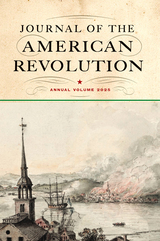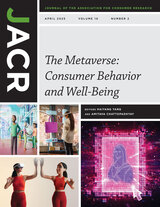33 start with O start with O

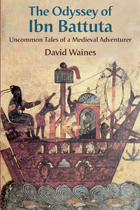
Ibn Battuta was, without doubt, one of the world’s truly great travelers. Born in fourteenth-century Morocco, and a contemporary of Marco Polo, Ibn Battuta left an account in his own words of his remarkable journeys, punctuated by adventure and peril, throughout the Islamic world and beyond. Whether sojourning in Delhi and the Maldives, wandering through the mazy streets of Cairo and Damascus, or contesting with pirates and shipwreck, the indefatigable Ibn Battuta brought to vivid life a medieval world brimming with marvel and mystery. Carefully observing the great diversity of civilizations that he encountered, Ibn Battuta exhibited an omnivorous interest in such matters as food and drink; religious differences among Christians, Hindus, and Shia Muslims; and ideas about purity and impurity, disease, women, and sex.
David Waines offers here a graceful analysis of Ibn Battuta’s travelogue. This is a gripping treatment of the life and times of one of history’s most daring, and at the same time most human, adventurers.
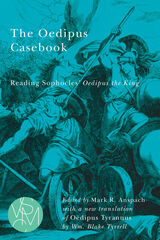
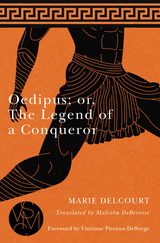
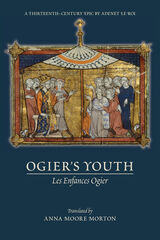
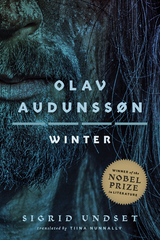
The fourth and final volume in the Nobel Prize–winning writer’s epic of one man’s fateful life in medieval Norway
Set in thirteenth-century Norway, a land racked by political turmoil, bloody family vendettas, and rising tensions between secular powers and an ascendant church, Sigrid Undset’s spellbinding masterpiece now follows the fortunes of Olav Audunssøn to the final, dramatic chapter of his life as it unfolds in Winter, the last volume of the tetralogy. When the orphaned Olav and his foster sister Ingunn became betrothed in their youth, a chain of events was set in motion that eventually led to violence, banishment, and a family separation lasting years. The consequences fracture their marriage and threaten the lineage for generations. Now, at the end of his life, Olav continues to grapple with the guilt of his sins as he watches his children, especially Eirik, make disastrous choices and struggle to find their rightful place in a family haunted by the past.
With its precise details and sweeping vision, Olav Audunssøn summons a powerful picture of Northern life in medieval times, as noted by the Swedish Academy in awarding Undset the Nobel Prize in 1928. Conveying both the intimate drama and the epic proportions of Olav’s story at its conclusion, Winter is a moving and masterly recreation of a vanished world tainted by bloodshed and haunted by sin and retribution—yet one that might still offer a chance for redemption.
As with Kristin Lavransdatter, her earlier medieval epic, Sigrid Undset wrote Olav Audunssøn after immersive research in the legal, religious, and historical writings of the time to create an astoundingly authentic and compelling portrait of Norwegian life in the Middle Ages. And as in her translation of Kristin Lavransdatter, Tiina Nunnally does full justice to Undset’s natural, fluid prose—in a style by turns plainspoken and delicately lyrical—to convey the natural world, the complex culture, and the fraught emotional territory against which Olav’s story inexorably unfolds.

What offers over seven hundred witty enigmas in several languages? Answer: The Old English and Anglo-Latin Riddle Tradition. Riddles, wordplay, and inscrutable utterances have been at the heart of Western literature for many centuries. Often brief and always delightful, medieval riddles provide insights into the extraordinary and the everyday, connecting the learned and the ribald, the lay and the devout, and the familiar and the imported. Many solutions involve domestic life, including “butter churn” and “chickens.” Others like “the harrowing of hell” or “the Pleiades” appeal to an educated elite. Still others, like “the one-eyed seller of garlic,” are too absurd to solve: that is part of the game. Riddles are not simply lighthearted amusement. They invite philosophical questions about language and knowledge.
Most riddles in this volume are translated from Old English and Latin, but it also includes some from Old Norse–Icelandic. The Old English and Anglo-Latin Riddle Tradition assembles, for the first time ever, an astonishing array of riddles composed before 1200 CE that continue to entertain and puzzle.
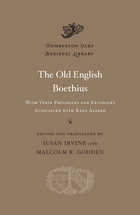
The Old English Boethius boldly refashions in Anglo-Saxon guise a great literary monument of the late-antique world, The Consolation of Philosophy. Condemned to death for treason around 525 ce, the Roman scholar Boethius turned to philosophy to transform his personal distress into a powerful meditation on fate, free will, and the human capacity for virtue in a flawed, fallen world. Boethius's Latin dialogues found a receptive audience in Anglo-Saxon England, where they were translated into Old English some time around 900. The translator (traditionally identified with King Alfred) freely adapts the Latin for a new audience: the Roman Fabricius, for example, becomes the Germanic weapon-smith Weland. The translation replicates Boethius’s alternation of prose and verse—only in this case Old English prose alternates with alliterative verse.
In later centuries Chaucer and Queen Elizabeth each turned The Consolation of Philosophy into English, but the Old English translation was the first to bring it to a wider vernacular audience. Verse prologues and epilogues for works traditionally associated with King Alfred fill out the volume, offering readers a fascinating glimpse of the moment when English confidently claimed its birthright as a literature capable of anything, from sublime ideas to subtle poetry.
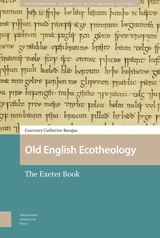


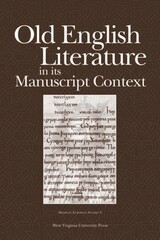
In Old English Literature in its Manuscript Context, editor Joyce Tally Lionarons has developed a multifaceted collection examining the issues facing the textual transmission of Anglo-Saxon writings. Eight established scholars consider the ideas of textual identity, authorship and translation, and editorial standards and obligations. This work also features a scholarly exchange of ideas and photographs of the original Anglo-Saxon manuscripts, making this essential reading for anyone interested in the history of Old English literature. The essays published in this text were originally composed at an NEH summer seminar conducted by Paul Szarmach and Timothy Graham at the Parker Library of Corpus Christi College, Cambridge in 1997.
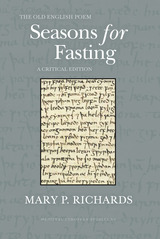
Seasons for Fasting, a late Old English poem probably composed in the early eleventh century, focuses on proper fasting observances in England. This poem, composed in eight-line stanzas, survives only in a sixteenth-century transcript made by the antiquary Laurence Nowell. With its topics, vocabulary, sources, and style derived from those of contemporary ecclesiastical prose, it belongs to a school of late tenth/early eleventh century poetry that only now is coming to be recognized and defined.
The Old English Poem Seasons for Fasting: A Critical Edition provides a new text and translation of the poem, accompanied by an extensive introduction, commentary, and glossary. The introduction includes analyses of the poem’s manuscript origins, sources, language, meter, style, and structure. The text is collated with all previous editions. The commentary elucidates points of grammar and style, and justifies all editorial decisions. The glossary covers every instance of each word in the poem.
Since its discovery among the papers of Laurence Nowell in 1934, the poem has had only four editions, two of the text with basic notes, and two in doctoral theses with more commentary and analysis. This new edition brings the latest resources on manuscript study, lexicon (through the Concordance and Dictionary of Old English A-G), poetics, and cultural milieu to bear on this fascinating poem. The apparatus, including the glossary, will allow fellow scholars to extend these findings through links to their own work.

Religious piety has rarely been animated as vigorously as in Old English Poems of Christ and His Saints. Ranging from lyrical to dramatic to narrative, the individual poems show great inventiveness in reimagining perennial Christian topics. In different poems, for example, Christ expels Lucifer from heaven, resists the devil's temptation on earth, mounts the cross with zeal to face death, harrows hell at the urging of John the Baptist, appears in disguise to pilot a ship, and presides over the Last Judgment. Satan and the fallen angels lament their plight in a vividly imagined hell and plot against Christ and his saints.
In Andreas the poet relates, in language reminiscent of Beowulf, the tribulations of the apostles Andrew and Matthew in a city of cannibals. In The Vision of the Cross (also known as The Dream of the Rood), the cross speaks as a Germanic warrior intolerably torn between the imperative to protect his Lord and the duty to become his means of execution. In Guthlac A, an Anglo-Saxon warrior abandons his life of violence to do battle as a hermit against demons in the fens of Lincolnshire. As a collection these ten anonymous poems vividly demonstrate the extraordinary hybrid that emerges when traditional Germanic verse adapts itself to Christian themes.
Old English Poems of Christ and His Saints complements the saints' lives found in The Old English Poems of Cynewulf, DOML 23.

The Old English poems attributed to Cynewulf, who flourished some time between the eighth and tenth centuries, are unusual because most vernacular poems in this period are anonymous. Other than the name, we have no biographical details of Cynewulf, not even the most basic facts of where or when he lived. Yet the poems themselves attest to a powerfully inventive imagination, deeply learned in Christian doctrine and traditional verse-craft.
Runic letters spelling out the name Cynewulf appear in four poems: Christ II (or The Ascension), Juliana, The Fates of the Apostles, and Elene. To these a fifth can be added, Guthlac B, because of similarities in style and vocabulary, but any signature (if one ever existed) has been lost because its ending lines are missing. What characterizes Cynewulf’s poetry? He reveals an expert control of structure as shown from the changes he makes to his Latin sources. He has a flair for extended similes and dramatic dialogue. In Christ II, for example, the major events in Christ’s life are portrayed as vigorous leaps. In Juliana the force of the saint’s rhetoric utterly confounds a demon sent to torment her.
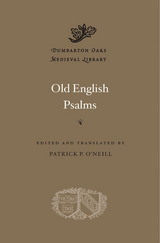
The Latin psalms figured prominently in the lives of the Anglo-Saxons, whether sung in the Divine Office by clerics, studied as a textbook for language learning by students, or recited in private devotion by lay people. They were also translated into Old English, first in prose and later in verse. Sometime in the middle of the eleventh century, the prose and verse translations were brought together and organized in a complementary sequence in a manuscript now known as the Paris Psalter. The prose version, traditionally attributed to King Alfred (d. 899), combines literal translation with interpretative clarification. In contrast, the anonymous Old English verse translation composed during the tenth century approaches the psalms in a spirit of prayer and devotion. Despite their differences, both reflect earnest attempts to capture the literal meaning of the psalms.
The complete text of all 150 prose and verse psalms is available here in contemporary English for the first time. With this translation readers encounter the beginnings and the continuation of a long tradition of psalm renderings in English.

The twenty-five poems and eleven metrical charms in this Old English volume offer tantalizing insights into the mental landscape of the Anglo-Saxons. The Wanderer and The Seafarer famously combine philosophical consolation with introspection to achieve a spiritual understanding of life as a journey. The Wife’s Lament, The Husband’s Message, and Wulf and Eadwacer direct a subjective lyrical intensity on the perennial themes of love, separation, and the passion for vengeance. From suffering comes wisdom, and these poems find meaning in the loss of fortune and reputation, exile, and alienation. “Woe is wondrously clinging; clouds glide,” reads a stoic, matter-of-fact observation in Maxims II on nature’s indifference to human suffering. Another form of wisdom emerges in the form of folk remedies, such as charms to treat stabbing pain, cysts, childbirth, and nightmares of witch-riding caused by a dwarf. The enigmatic dialogues of Solomon and Saturn combine scholarly erudition and proverbial wisdom. Learning of all kinds is celebrated, including the meaning of individual runes in The Rune Poem and the catalog of legendary heroes in Widsith.
This book is a welcome complement to the previously published DOML volume Old English Shorter Poems, Volume I: Religious and Didactic.

Alongside famous long works such as Beowulf, Old English poetry offers a large number of shorter compositions, many of them on explicitly Christian themes. This volume of the Dumbarton Oaks Medieval Library presents twenty-nine of these shorter religious poems composed in Old and early Middle English between the seventh and twelfth centuries. Among the texts, which demonstrate the remarkable versatility of early English verse, are colorful allegories of the natural world, poems dedicated to Christian prayer and morality, and powerful meditations on death, judgment, heaven, and hell.
Previously edited in many different places and in some instances lacking accessible translations, many of these poems have remained little known outside scholarly circles. The present volume aims to offer this important body of texts to a wider audience by bringing them together in one collection and providing all of them with up-to-date translations and explanatory notes. An introduction sets the poems in their literary-historical contexts, which are further illustrated by two appendices, including the first complete modern English translation of the so-called Old English Benedictine Office.
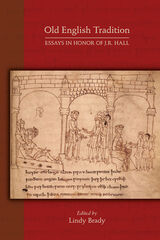
Old English Tradition contains eighteen new essays by leading scholars in the field of Old English literary studies. The collection is centered around five key areas of research—Old English poetics, Anglo-Saxon Christianity, Beowulf, codicology, and early Anglo-Saxon studies—on which the work of scholar J. R. Hall, the volume’s honorand, has been influential over the course of his career.
The volume’s contents range from fresh insights on individual Old English poems such as The Wife’s Lament and Beowulf; new studies in Old English metrics and linguistics; codicological examinations of individual manuscripts; fresh editions of understudied texts; and innovative examinations of the role of early antiquarians in shaping the field of Old English literary studies as we know it today.

Old Norse mythology is elusive: it is the label used to describe the religious stories of the pre-Christian North, featuring such well-known gods as Odin and Thor, yet most of the narratives have come down to us in manuscripts from the Middle Ages mainly written by Christians. Our view of the stories as they were transmitted in oral form in the pre-Christian era is obscured.
To overcome these limitations, this book assembles comparisons from a range of theoretical and analytical perspectives—across media, cultures, and disciplines. Fifteen scholars from a wide range of fields examine the similarities of and differences of the Old Norse mythologies with the myths of other cultures. The differences and similarities within the Old Norse corpus itself are examined to tease out the hidden clues to the original stories.
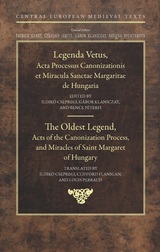

Maximos the Confessor (580–662) occupies a unique position in the history of Byzantine philosophy, theology, and spirituality. His profound spiritual experiences and penetrating theological vision found complex and often astonishing expression in his unparalleled command of Greek philosophy, making him one of the most challenging and original Christian thinkers of all time. So thoroughly did his thought come to influence the Byzantine theological tradition that it is impossible to trace the subsequent history of Orthodox Christianity without knowledge of his work.
The Ambigua (or “Book of Difficulties”) is Maximos’s greatest philosophical and doctrinal work, in which his daring originality, prodigious talent for speculative thinking, and analytical acumen are on lavish display. In the Ambigua, a broad range of theological topics—cosmology, anthropology, the philosophy of mind and language, allegory, asceticism, and metaphysics—are transformed in a synthesis of Aristotelian logic, Platonic metaphysics, Stoic psychology, and the arithmetical philosophy of a revived Pythagoreanism. The result is a labyrinthine map of the mind’s journey to God that figured prominently in the Neoplatonic revival of the Komnenian Renaissance and the Hesychast Controversies of the Late Byzantine period.
This remarkable work has never before been available in a critically-based edition or English translation.

Maximos the Confessor (580–662) occupies a unique position in the history of Byzantine philosophy, theology, and spirituality. His profound spiritual experiences and penetrating theological vision found complex and often astonishing expression in his unparalleled command of Greek philosophy, making him one of the most challenging and original Christian thinkers of all time. So thoroughly did his thought come to influence the Byzantine theological tradition that it is impossible to trace the subsequent history of Orthodox Christianity without knowledge of his work.
The Ambigua (or “Book of Difficulties”) is Maximos’s greatest philosophical and doctrinal work, in which his daring originality, prodigious talent for speculative thinking, and analytical acumen are on lavish display. In the Ambigua, a broad range of theological topics—cosmology, anthropology, the philosophy of mind and language, allegory, asceticism, and metaphysics—are transformed in a synthesis of Aristotelian logic, Platonic metaphysics, Stoic psychology, and the arithmetical philosophy of a revived Pythagoreanism. The result is a labyrinthine map of the mind’s journey to God that figured prominently in the Neoplatonic revival of the Komnenian Renaissance and the Hesychast Controversies of the Late Byzantine period.
This remarkable work has never before been available in a critically-based edition or English translation.

On Morals or Concerning Education is an exhortation on the importance of education by the prolific late-Byzantine author and statesman Theodore Metochites (1270–1332), who rose to the aristocracy from a middle-class background but fell from favor late in life and died as a monk. As a manual of proper living and ethical guidance, the treatise offers unique insights into the heightened roles of philosophy and rhetoric at a time when the elite engaged intensely with their Hellenic heritage, part of a larger imperial attempt to restore Byzantium to its former glories.
On Morals probes hotly disputed issues in fourteenth-century Byzantine society, such as the distinction between the active and contemplative life and the social position of scholars. Metochites’s focus on the character and function of Christian faith also reflects ongoing debates regarding the philosophy of religion. Occasional autobiographical digressions offer fascinating glimpses of Metochites’s distinctive personality.
This volume provides the full Byzantine Greek text alongside the first English translation of one of Metochites’s longest works.
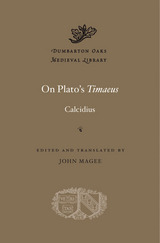
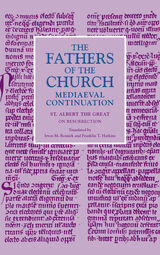
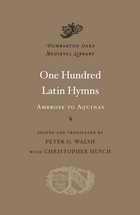
“How I wept at your hymns and songs, keenly moved by the sweet-sounding voices of your church!” wrote the recently converted Augustine in his Confessions. Christians from the earliest period consecrated the hours of the day and the sacred calendar, liturgical seasons and festivals of saints. This volume collects one hundred of the most important and beloved Late Antique and Medieval Latin hymns from Western Europe.
These religious voices span a geographical range that stretches from Ireland through France to Spain and Italy. They meditate on the ineffable, from Passion to Paradise, in love and trembling and praise. The authors represented here range from Ambrose in the late fourth century ce down to Bonaventure in the thirteenth. The texts cover a broad gamut in their poetic forms and meters. Although often the music has not survived, most of them would have been sung. Some of them have continued to inspire composers, such as the great thirteenth-century hymns, the Stabat mater and Dies irae.

Arno Borst examines the various ways that time has been calculated by numbers and measured by instruments over several centuries, from the computus—an ancient method of determining times and dates—to the present-day computer. In a wide-ranging discussion, he analyzes the classical Greek concepts of divine, natural, and human time; the universal time of ancient Rome; the Easter cycle of the Middle Ages; the development of the mechanical clock in the fourteenth and fifteenth centuries; early modern chronology; and twentieth-century data processing.
Borst argues that although many centuries and countless different instruments—sundials, horologia, abaci, astrolabes, calendars, and calculating machines—separate the medieval computus from the modern computer, each generation has had to answer the same question: how can we make the best use of our available time to improve our lives? The computer, he suggests, is merely a new instrument employed for an ancient purpose.
Lively and accessible, The Ordering of Time will be welcomed by students and researchers in social and cultural history, the history of science and mathematics, as well as anyone interested in the history of time and numbers.
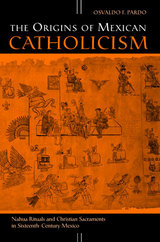
---Fernando Cervantes, Bristol University, UK
"Pardo does an excellent job of balancing and contrasting sixteenth-century Catholic theology with Nahua thought and belief."
---John F. Schwaller, University of Minnesota
At first glance, religious conversion may appear to be only a one-way street. When studying sixteenth-century Mexico, one might assume that colonial coercion was the driving force behind the religious conversion of the native population. But The Origins of Mexican Catholicism shows how Spanish missionaries instead drew on existing native ceremonies in order to make Christianity more accessible to the Nahua population whom they were trying to convert.
Osvaldo F. Pardo explains that religious figures not only shaped native thought, but that indigenous rituals had an impact on the religion itself. This work illustrates the complex negotiations that took place in the process of making the Christian sacraments available to the native peoples, and at the same time, forced the missionaries to reexamine the meaning of their sacraments through the eyes of an alien culture.
For Spanish missionaries, ritual not only became a focus of evangelical concern but also opened a window to the social world of the Nahuas. Missionaries were able to delve into the Nahua's notions of self, emotions, and social and cosmic order. By better understanding the sociological aspects of Nahua culture, Christians learned ways to adequately convey their religion through mutual understanding instead of merely colonial oppression.
Given its interdisciplinary approach, this book will be of interest to specialists in Latin American intellectual and literary history, the history of religion, and anthropology, and to anyone interested in cross-cultural processes.
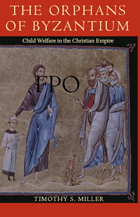
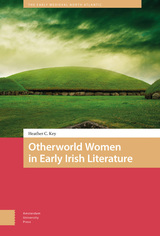

Medieval literature is full of strange moments when infants (even fetuses) speak. In Out of the Mouths of Babes, Julie Singer explores the unsettling questions raised by these events, including What is a person? Is speech fundamental to our humanity? And what does it mean, or what does it matter, to speak truth to power?
Singer contends that descriptions of baby talk in medieval French literature are far from trivial. Through treatises, manuals, poetry, and devotional texts, Singer charts how writers imagined infants to speak with an authority untainted by human experience. What their children say, then, offers unique insight into medieval hopes for universal answers to life’s deepest wonderings.
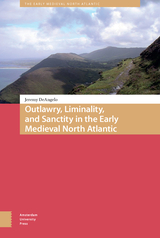
READERS
Browse our collection.
PUBLISHERS
See BiblioVault's publisher services.
STUDENT SERVICES
Files for college accessibility offices.
UChicago Accessibility Resources
home | accessibility | search | about | contact us
BiblioVault ® 2001 - 2025
The University of Chicago Press


